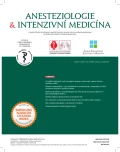-
Medical journals
- Career
Echocardiography accrediation for intensivists: The European Diploma in Echocardiography (EDEC)
Authors: M. Balík
Authors‘ workplace: Klinika anesteziologie, resuscitace a intenzivní medicíny, 1. lékařská fakulta Univerzity Karlovy a Všeobecná fakultní nemocnice v Praze
Published in: Anest. intenziv. Med., 29, 2018, č. 2, s. 77-81
Category:
Overview
Echocardiography at its basic level has become a compulsory component of the educational curriculum in intensive care and an ultrasound device should become standard equipment in the intensive care unit. The issue of quality and standardization of education in echocardiography is addressed by available accreditations, which should provide a growing number of supervisors for the basic level, and stimulate the spread of echocardiographic applications and research in the field of non-invasive haemodynamics. Since 2016, an opportunity exists in the EU to gain the accreditation in critical care echocardiography in the form of the European Diploma in Echocardiography (EDEC), which is unique in combining transthoracic (TTE) and transesophageal (TEE) echocardiography. To obtain the accreditation, the Czech intensivist is expected to register with his/her supervisor at the EDEC Board. A supervisor might be someone in possession of a renowned accreditation or a board certified cardiologist. The accreditation is granted after 40 hours of certified courses, completion and logging of 100 TTEs plus 35 TEEs into a structured logbook, passing of the MCQ test, a video case-reporting test and a practical TEE exam on an electronic trainer (http://www.esicm.org/education/edec).
Keywords:
echocardiography – ultrasonography – chest ultrasonography – intensive care – accreditation in echocardiography
Sources
1. Price, Via G, Sloth E, et al. Echocardiography practice, training and accreditation in the intensive care: document for the World Interactive Network Focused on Critical Ultrasound (WINFOCUS). Cardiovascular Ultrasound. 2008;6 : 49.
2. Vieillard-Baron A, Slama M, Cholley B, et al. Echocardiography in the intensive care unit: from evolution to revolution? Intensive Care Med. 2008;34 : 243–249.
3. Mayo P, Beaulieu Y, Doelken P, et al. American College of Chest Physicians/La Société de Réanimation de Langue Française statement on competence in critical care ultrasonography. Chest. 2009;135 : 1050–1060.
4. Mayo P, Arntfield R, Balik M, et al. The ICM research agenda on critical care ultrasonography. Intensive Care Med. 2017;43 : 1257–1269.
5. Expert Round Table on Ultrasound in ICU (Cholley BP, Mayo PH, Poelaert J, et al.). International expert statement on training standards for critical care ultrasonography. Intensive Care Med. 2011;37 : 1077–1083.
6. Vieillard-Baron A, Mayo PH, Vignon P, et al. International consensus statement on training standards for advanced critical care echocardiography. See comment in PubMed Commons belowIntensive Care Med. 2014;40 : 654–666.
Labels
Anaesthesiology, Resuscitation and Inten Intensive Care Medicine
Article was published inAnaesthesiology and Intensive Care Medicine

2018 Issue 2-
All articles in this issue
- Sleep endoscopy – a new challenge for the anaesthetist in the diagnostics and treatment of the obstructive sleep apnea syndrome
- Is laryngeal mask airway the method of choice for airway management in open tracheal surgery?
- Echocardiography accrediation for intensivists: The European Diploma in Echocardiography (EDEC)
- Sterility of lidocaine syringes prepared in advance in the obstetric theatre
- The role of videolaryngoscopy in perioperative medicine
- Impact of adrenaline on the intra-arrest haemodynamics during experimental cardiac arrest
- Anaesthesiology and Intensive Care Medicine
- Journal archive
- Current issue
- Online only
- About the journal
Most read in this issue- The role of videolaryngoscopy in perioperative medicine
- Sleep endoscopy – a new challenge for the anaesthetist in the diagnostics and treatment of the obstructive sleep apnea syndrome
- Impact of adrenaline on the intra-arrest haemodynamics during experimental cardiac arrest
- Echocardiography accrediation for intensivists: The European Diploma in Echocardiography (EDEC)
Login#ADS_BOTTOM_SCRIPTS#Forgotten passwordEnter the email address that you registered with. We will send you instructions on how to set a new password.
- Career

